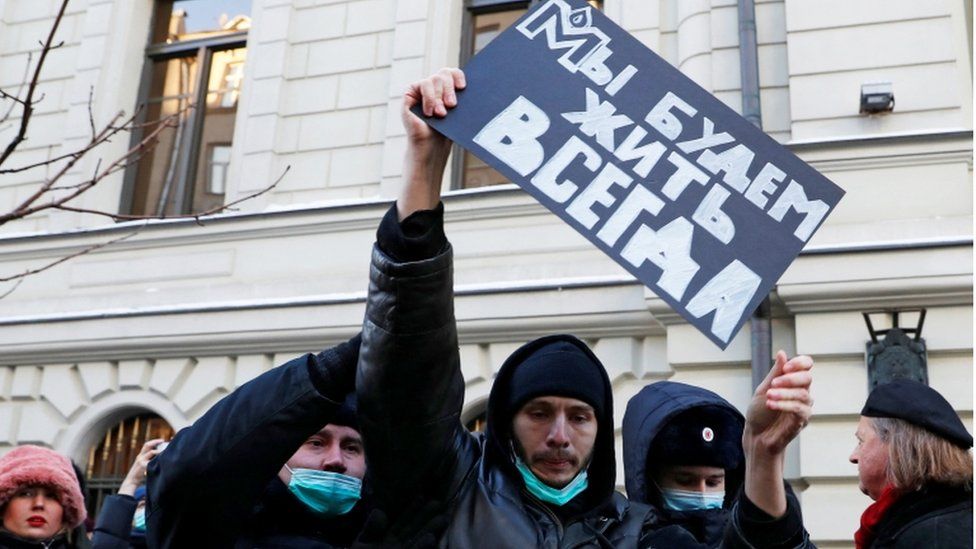Russia's Supreme Court has ordered the closure of International Memorial, Russia's oldest human rights group.
Memorial worked to recover the memory of the millions of innocent people executed, imprisoned or persecuted in the Soviet era.
Formally it has been "liquidated" for failing to mark a number of social media posts with its official status as a "foreign agent".
That designation was given in 2016 for receiving funding from abroad.
But in court the prosecutor labelled Memorial a "public threat", accusing the group of being in the pay of the West to focus attention on Soviet crimes instead of highlighting a "glorious past".
Founded in 1989, Memorial became a symbol of a country opening up to the world - and to itself - as Russia began examining the darkest chapters of its past. Its closure is a stark symbol of how the country has turned back in on itself under President Vladimir Putin, rejecting criticism - even of history - as a hostile act.
There were shouts of "shame!" from those in court as the decision was read out.
The ruling also shines a light on the rise in repression in modern-day Russia, where Memorial's own human rights wing now lists more than 400 political prisoners, and independent groups and media are increasingly blacklisted as "foreign agents".
In court, lawyers for Memorial argued that the group's work was beneficial for the "health of the nation". They declared Memorial a friend of Russia, not its enemy, and called the case for liquidation absurd and "Orwellian".
Among the sites the group failed to mark with its "foreign agent" status was the vast database of victims of political repression that it has assembled over three decades of work.
The team argued that any mistakes had been corrected and that shutting down a prominent and respected organisation over such technical errors was disproportionate.
In a statement later on Tuesday, International Memorial said it would challenge the ruling and find legitimate ways to continue its work. Russians needed an honest reflection of their past and no-one would succeed in "liquidating" that need, it added.
The justice ministry argued that a group's social significance could be no excuse for breaking the law. But the prosecution's closing speech pointed to a deeper motivation for this case.
"International Memorial… is almost entirely focused on distorting historic memory, first and foremost about the Great Fatherland War [World War Two]," Alexei Zhafyarov told the court, accusing the group of creating a false image of the USSR as a "terrorist" state.
Vladimir Putin has placed great store on the Soviet victory over the Nazis in World War Two, part of his hankering for the old days of superpower status - a far more attractive focus for many Russians than the parallel history of secret courts, prison camps and firing squads.
"Why should we, descendants of the victors, be ashamed and repent, rather than take pride in our glorious past? Memorial is probably paid by someone for that," the prosecutor claimed in court.
"They chose us because we are strong and prominent, and because we irritate them," Memorial board member Oleg Orlov recently told the BBC about the move to shutter an organisation he has been with from the start.
The organisation has faced pressure for many years, but that pressure intensified as Russia was swept by a fiercely patriotic wave following the annexation of Crimea from Ukraine in 2014.
Memorial's walls were smeared with graffiti, its work smeared on state TV as subversive, and in 2016 it was listed as a "foreign agent" - a slur eerily reminiscent of Stalinist times when those marked as "enemies of the people" were persecuted and purged.
Just this October, when a crowd gathered at Memorial's Moscow headquarters to watch Mr Jones, a film about the Stalin-era famine that killed millions in Ukraine, a nationalist mob burst in and rushed on stage calling the audience "fascists" and yelling: "Hands off our history".
Sister organisation Memorial Human Rights Centre, which works to document modern-day political repression and rights violations, is also facing closure for alleged violations of the foreign agents law. A ruling in its own case is expected this week.
Memorial says it will challenge the decisions, including in the European Court of Human Rights.
Oleg Orlov believes the case against both is intended as a warning: "The attack on us is meant as a strong signal to all civil society in Russia. They're saying: 'Look! If we can do this with them, then it's no problem to liquidate all you lot too,'" he told the BBC.
"The time has come to purge the field for good."
https://www.bbc.com/news/world-europe-59808624

